Art & Culture
- Details
- Written by Steven Aiello
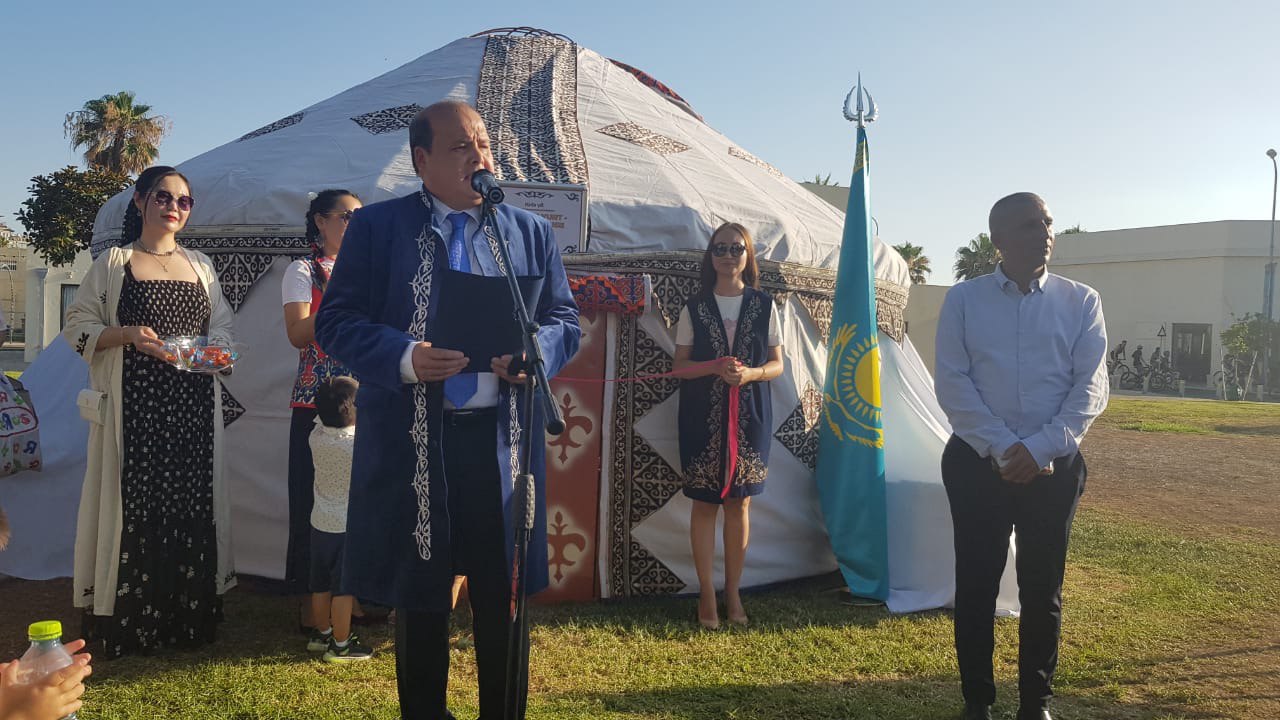
Central Asia Arrives in Tel Aviv with a Yurt Installation by the Embassy of Kazakhstan
For those yearning to resume international travel, the Embassy of Kazakhstan offers the next best thing--a taste of travel abroad brought home. On Thursday evening the embassy inaugurated a traditional Kazakh Yurt, as part of the National Day of Dombra festivities.
Yurts have played a central role in the nomadic lifestyle of Central Asian people for millennia, and are included on the UNESCO list of cultural heritage of humanity. But it is thanks to the embassy of Kazakhstan that a traditional Yurt can now be visited by all, in the heart of Tel Aviv.
Ambassador Satybaldy Burshakov opened the Day of Dombra festivities by discussing the rich heritage that the Yurt stands for: “peace, unity of the nation and family, traditional hospitality and openness.” In a finely embroidered traditional gown, the ambassador noted that the Shanyrak - the top of the yurt, the roof window and the hole for ventilation, can be seen on the National Emblem of the Republic of Kazakhstan.
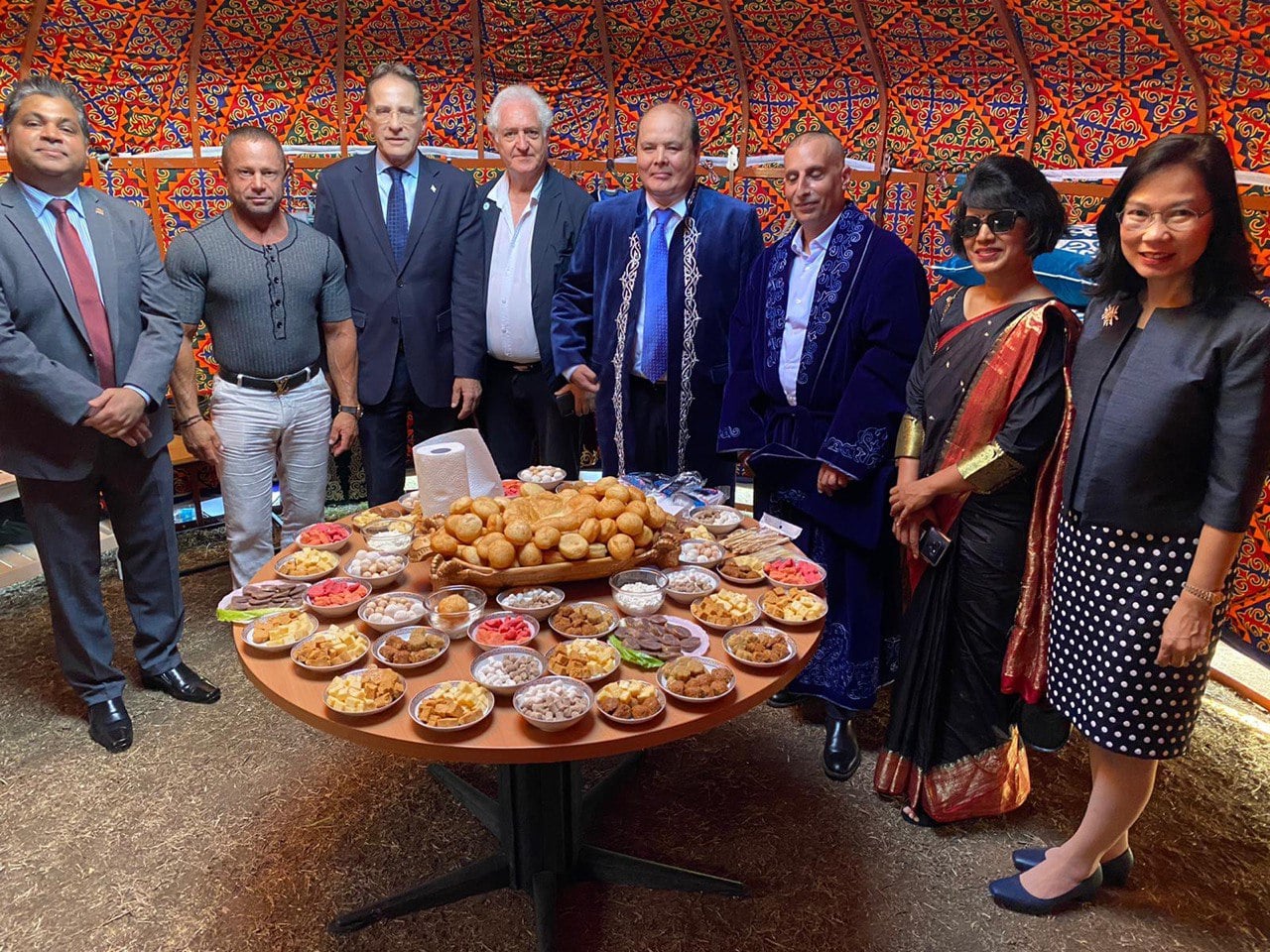
Discussing the warm ties between Kazakhstan and Israel, the ambassador explained that during Holocaust thousands of Jews found shelter in Kazakhstan and neighboring countries of Central Asia, and then become contributors to scientific and cultural development of Kazakhstan. Leaping forward, Ambassador Burshakov stressed that in the thirty years since independence, “Kazakhstan made a great journey and now it is a dynamic modern state which successfully transitioned from lower-middle-income to upper-middle-income status in less than two decades.”
The evening was truly a cultural and artistic celebration, and guests were delighted to enjoy live musical performances from traditional Kazakh instruments, and with singing as well. Traditional sweets were served as well.
The event was also an inauguration of an important literary work--the Book of Words
written by Abai Kunanbayuly, a great Kazakh poet, enlightener, philosopher and public figure of the second half of the XIX century, was translated to Hebrew by the Kazakhstan Embassy on the occasion of the 175 Anniversary of Abai and was presented to the public for the first time. The ambassador thanked translator Polina Brukman and Alla Serebrinskaya, the Director of Beit Nelly Media publishing company for their great contribution to this noble project, and presented certificates from the Minister of Culture and Sports of Kazakhstan Mrs Raimkulova.
Concluding the festivities, Ambassador Burshakov cut the ribbon, and invited Tel Aviv City Council Member Mr. Gal Sharabi to be the first guest to enter the Yurt.
The Yurt is located in the Tel Aviv Port Park and open to the public 10:00 to 20:00, July 2 to July 10.
Photos courtesy Embassy of Kazakhstan
- Details
- Written by Silvia G. Golan
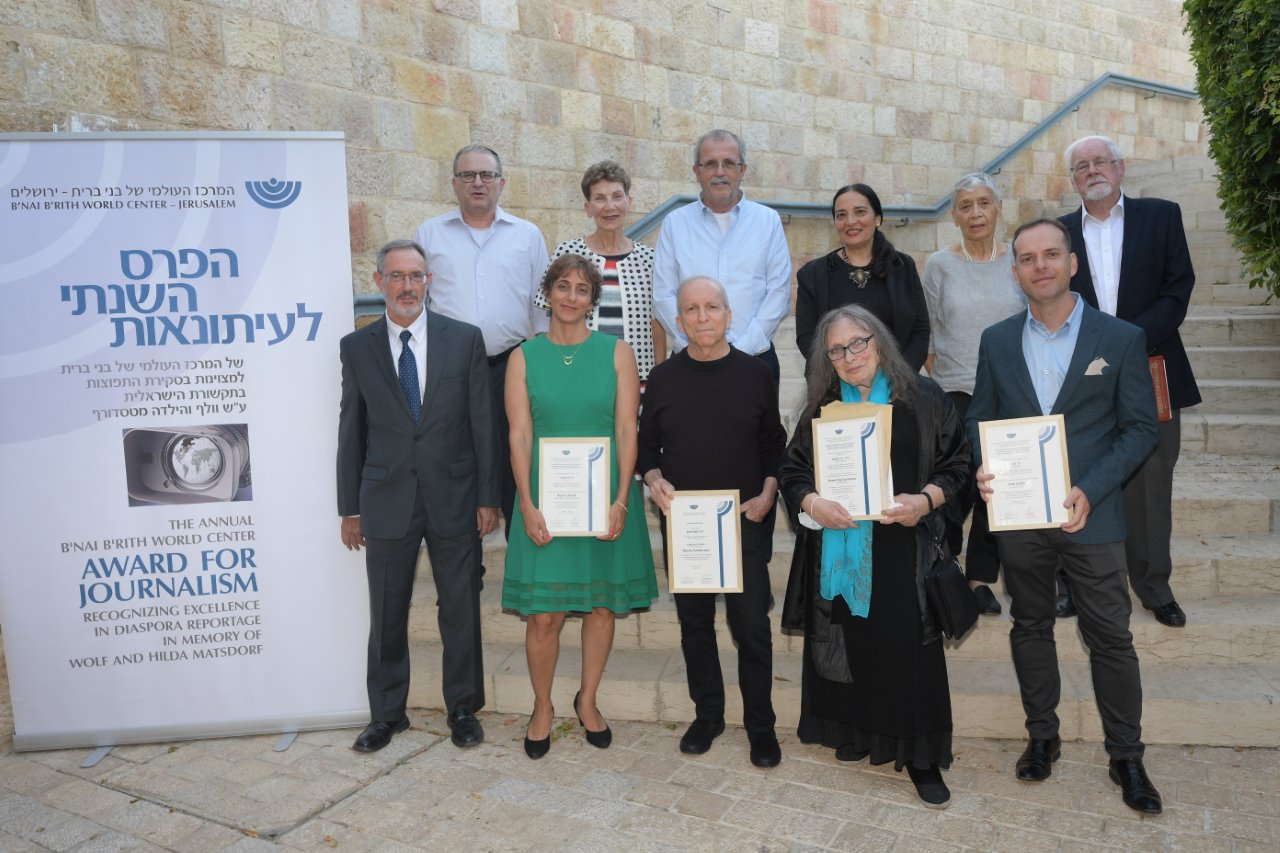
President Rivlin, broadcasted a videotaped greeting the winners of the B’nai B’rith World Center-Jerusalem Award for Journalism recognizing excellence in Diaspora reportage for 2021
Professor Yedidia Z. Stern, president of the Jewish People Policy Institute, delivered the keynote address, entitled "The Israeli Identity Crisis", at the B’nai B’rith World Center-Jerusalem Award for Journalism Recognizing Excellence in Diaspora Reportage for 2021.
The ceremony took place on Thursday, July 1 at the Konrad Adenauer Conference Center, Mishkenot Sha'ananim in Jerusalem.
In a video recording, President of the State, Reuven Rivlin, congratulated the winners of the important award and emphasized his special connection to B'nai B'rith thanks to his father, Prof. Yosef Yoel Rivlin, served as President of the B'nai B'rith Israel.
Nachman Shai, Israel’s recently-appointed Minister of Diaspora Affairs, delivered a speech via Zoom—one of his first speeches in his new position. He stated that The Ministry of Diaspora Affairs
has three main tasks in strengthening the connection between Israel and the Diaspora: increasing solidarity, mutual commitment and a pluralistic approach to all streams of Judaism. Minister Shai stressed that no stream has a monopoly on authentic Judaism.
Alan Schneider, Director of B'nai B'rith World Center in Jerusalem, stated that the award is widely recognized as the most prestigious prize in the Israeli media industry for Diaspora reportage and was established to help strengthen the relationship between Israel and the Diaspora.
Referencing findings in a recently-released Pew Research Center survey of Jewish Americans, Schneider pointed to evidence of a growing distancing of American Jews from Israel – the major challenge to Israel-Diaspora relations in the future.
Winners of the Award for 2021 are: Nurit Canetti, anchorwoman, editor-in-chief and producer of Galey Zahal—IDF Army Public Radio (broadcast media category) and Dan Lavie, Diaspora Affairs correspondent of Yisrael Hayom (print media category).
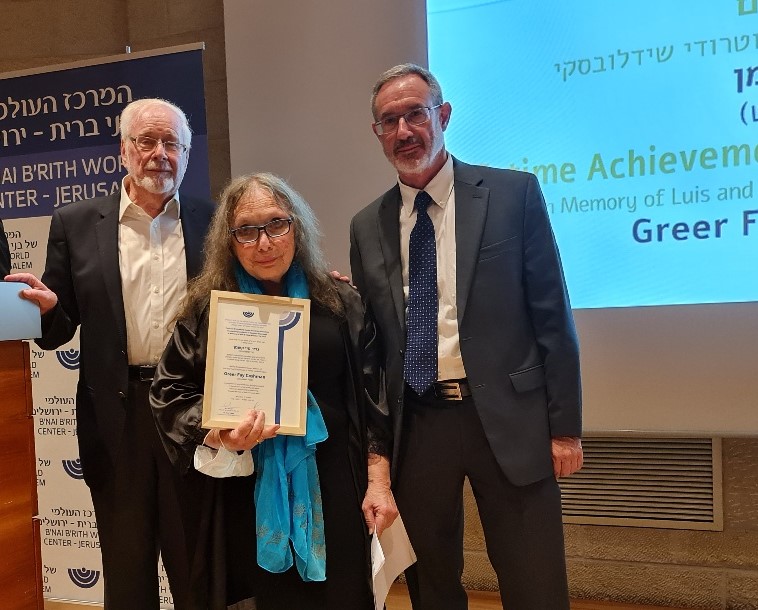
In addition, Greer Fay Cashman, who has appeared in the Jerusalem Post for more than 45 years, received a Lifetime Achievement Award. She is the author of the popular “Grapevine” column and the newspaper’s correspondent at the Office of the President of Israel.
A special citation for Fostering Israel-Diaspora Relations through the Arts was presented to famous singer, songwriter and author, Danny Sanderson. The citation was established in 2014 and has been presented to Nurit Hirsh, David D’Or, Idan Raichel,
David Broza, Yehoram Gaon and the Shalva Band.
Since its establishment in 1992, the B’nai B’rith World Center Award for Journalism has recognized excellence in reporting on contemporary Diaspora Jewish communities and on the state of Israel-Diaspora relations in the Israeli print, broadcast and online media.
The award highlights the important contributions the media can make toward strengthening the relationship between Israel and world Jewry by encouraging quality reporting on Diaspora communities and Israel-Diaspora relations.
The distinguished members of the award jury are: Ya'akov Ahimeir, past editor and anchor, Israel Public Broadcasting Corporation and Lifetime Achievement Award winner for 2016; Professor Yehudith Auerbach, School of Communication, Bar Ilan University;
Professor Sergio DellaPergola, The Institute of Contemporary Jewry, Hebrew University; Sallai Meridor, former Israeli ambassador to the United States and former chairman of the Zionist Executive and Jewish Agency for Israel;
Professor Gabriela Shalev, Higher Academic Council, Ono Academic College and former Israeli ambassador to the United Nations; journalist Yair Sheleg; Asher Weill, publisher and editor of “Ariel” The Israel Review of Arts and Letters (1981-2003).
Grupal Photo Courtesy: Bruno Sharvit.
From right to left (bottom line): Dan Lavie, Greer Fay Cashman, Danny Sanderson, Nurit Canetti, Alan Schneider.
In the top row from right to left: Asher Weill, Professor Gabriela Shalev, Dr Hadas Hacohen, Professor Yedidia Z. Stern, Professor Yehudith Auerbach and journalist Yair Sheleg.
Photo of Greer Fay Cashman by Silvia G. Golan
- Details
- Written by Silvia G. Golan

For the first time: Following the Abraham Accords, a virtual stamp exhibition AAPE 2021 of the best philatelic collections of Israel the United States and the United Arab Emirates.
The exhibition will be open to the public from June 15th until June 30th free of charge
The Abraham Accords Philatelic Exhibition (AAPE 2021) is a virtual exhibition of stamps and other philatelic items. The exhibition is part of the implementation of the Abraham Accords in the field of philately. It is organized the Israeli Philatelic Federation (IPF).
The exhibition, which will open on June 15th and close of June 30th will include 5 different categories, and many rare and expensive items, some of which are centuries old. Among the different categories are:
- Traditional Philately: Collections that focus on the stamps of a single country at a certain time. For example, one of the Israeli exhibits in this category is devoted to the early stamps of Mozambique. Another collection from the U.S. is about the first stamps of Israel (“Doar Ivri” stamps), and shows the “behind the scene” items of that issue: the original artist proposals, the debate about the name of the country not yet born, early production steps, complete sheets and the perforation trials.
- Postal History: Collections of letters sent through the mail at a specific time to and from a specific place. For example, one of the exhibits depicts letter sent to and from the holy land during the Ottoman period. Another exhibit is devoted to letters that were sent throughout the Mediterranean by airmail in airplanes that experienced crashes, and yet survived the ordeal. Collectors form the UAE will exhibit some collections of the postal history of the emirates from the British era, when the Emirates were known as “the Trucial States”.
- Thematic Philately: Collections by themes, such as animals or flowers. The exhibit will include an American exhibit on palm trees, and an Israeli collection devoted to the game of chess, making a comparison between “the game of war” and real life warfare.
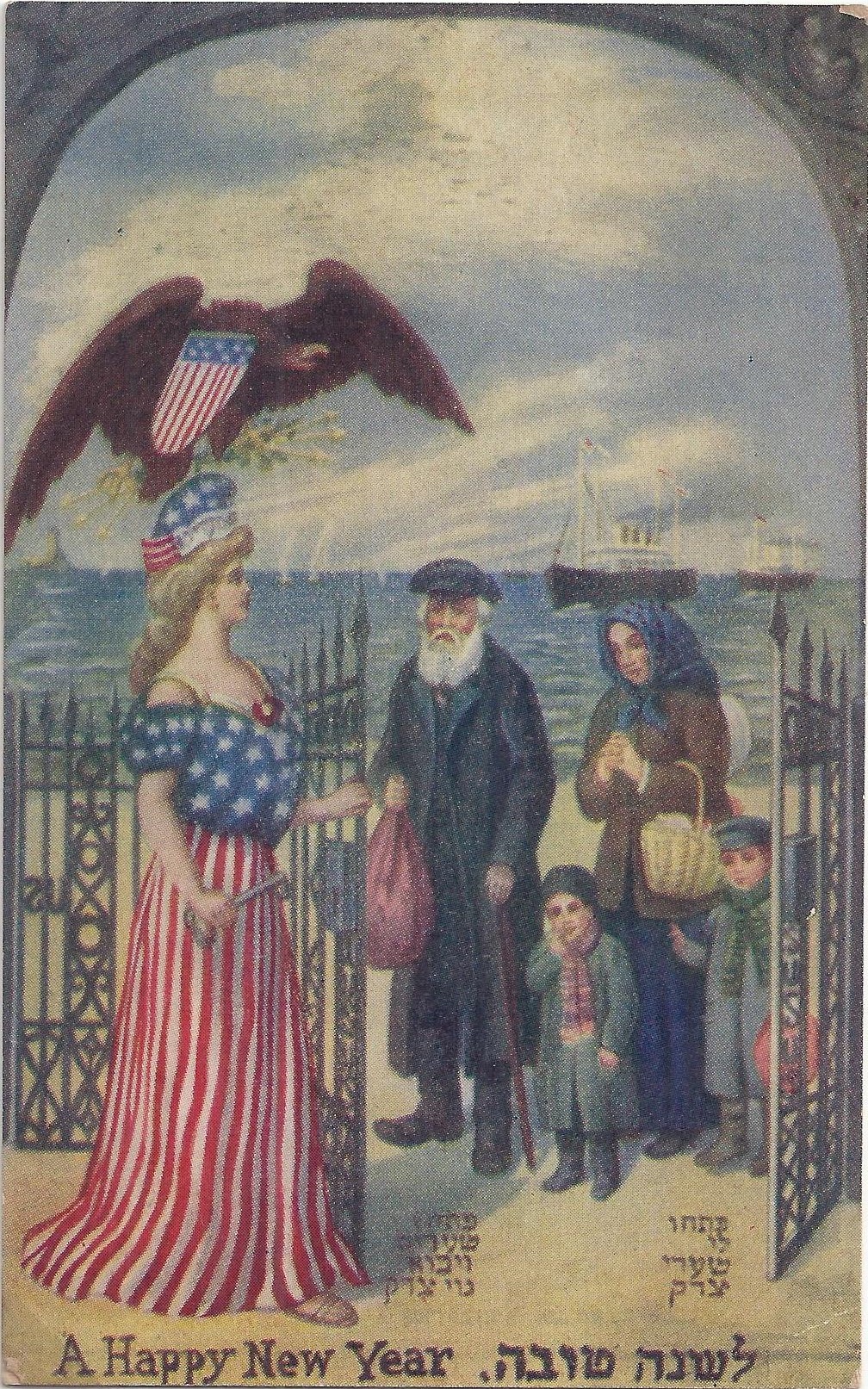
- Picture postcards: One of the exhibits here is a pilgrim tour in the Holi land around the end of the 19th century. Through postcards that are over 100 years old the exhibitor shows what a pilgrim saw while visiting the places sacred to Christianity, and the experience he had gone through. Another collection shows “Shana Tova” postcards, while a third collections takes us to Shanghai in the late 19th century.
- Court of Honor: One exhibit from each of the participating countries, which have previously won top awards in exhibitions worldwide.
Overall, each of the three countries will be represented by up to 9 collections, with at least half of them being related to the Middle East.
The exhibits included in AAPE 2021 will be judged by a panel of experienced judges from the three countries. The members of the jury are experienced collectors and exhibitors, who were specially trained on how to evaluate philatelic exhibits.
AAPE 2021 will open on June 15th and end on June 30th at www.aape2021.com
The exhibition is organized by the Israeli Philatelic Federation (IPF), a non profit organization that promotes stamp collecting in the country. The IPF works in collaboration with the Israeli Philatelic Service, and is supported by the Israeli post. The IPF was founded in 1945, and a year later was accepted as a member of the international Federation of Philately (the F.I.P).
Despite the technological advances and the emergence of social media all the countries of the world still issue stamps that reflect their values and commemorate their countries and their way of living.
The virtual stamp exhibition AAPE 2021, which includes collections from Israel, the United States and the United Arab Emirates will be open to the public free of charge from June 15th till June 30th at www.aape2021.com
AAPE 2021 will open on June 15th and end on June 30th at www.aape2021.com
Photos courtesy Israeli Philatelic Federation (IPF)
- Details
- Written by Tel Aviv University
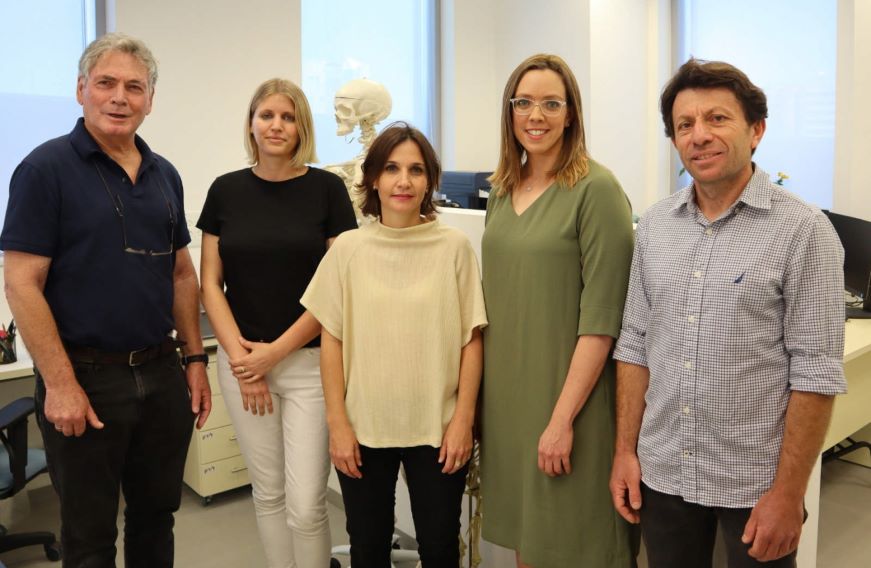
Joint research of Tel Aviv University and the Hebrew University Dramatic discovery in Israeli excavation:
A new type of Homo unknown to science
- The bones of an early human, unknown to science, who lived in the Levant at least until 130,000 years ago, were discovered in excavations at the Nesher Ramla site, near the city of Ramla. According to common practice, the new Homo fossil was named after the site where it was discovered – the Nesher Ramla Homo type. Recognizing similarity to other archaic Homo specimens from 400,000 years ago, found in Israel and Eurasia, the researchers reached the conclusion that the Nesher Ramla fossils represent a unique Middle Pleistocene population, now identified for the first time.
- The discovery of a new Homo group in this region, which resembles Pre-Neanderthal populations in Europe, challenges the prevailing hypothesis that Neanderthals originated from Europe, suggesting that at least some of the Neanderthals' ancestors actually came from the Levant.
- The new finding suggests that two types of Homo groups lived side by side in the Levant for more than 100,000 years (200-100,000 years ago), sharing knowledge and tool technologies: the Nesher Ramla people who lived in the region from around 400,000 years ago, and the Homo sapiens who arrived later, some 200,000 years ago.
- The new discovery also gives clues about a mystery in human evolution: How did genes of Homo sapiens penetrate the Neanderthal population that had presumably lived in Europe long before the arrival of Homo sapiens?
- The researchers claim that at least some of the later Homo fossils found previously in Israel, like those unearthed in the Skhul and Qafzeh caves, do not belong to archaic (early) Homo sapiens, but rather to groups of mixed Homo sapiens and Nesher Ramla lineage.
Nesher Ramla Homo type – a prehistoric human previously unknown to science: Researchers from Tel Aviv University and the Hebrew University of Jerusalem have identified a new type of early human at the Nesher Ramla site, dated to 140,000 to 120,000 years ago. According to the researchers, the morphology of the Nesher Ramla humans shares features with both Neanderthals (especially the teeth and jaws) and archaic Homo (specifically the skull). At the same time, this type of Homo is very unlike modern humans – displaying a completely different skull structure, no chin, and very large teeth. Following the study's findings, researchers believe that the Nesher Ramla Homo type is the 'source' population from which most humans of the Middle Pleistocene developed. In addition, they suggest that this group is the so-called 'missing' population that mated with Homo sapiens who arrived in the region around 200,000 years ago - about whom we know from a recent study on fossils found in the Misliya cave.
Two teams of researchers took part in the dramatic discovery, published in the prestigious Science journal: an anthropology team from Tel Aviv University headed by Prof. Israel Hershkovitz, Dr. Hila May and Dr. Rachel Sarig from the Sackler Faculty of Medicine and the Dan David Center for Human Evolution and Biohistory Research and the Shmunis Family Anthropology Institute, situated in the Steinhardt Museum at Tel Aviv University; and an archaeological team headed by Dr. Yossi Zaidner from the Institute of Archaeology at the Hebrew University of Jerusalem.
Timeline: The Nesher Ramla Homo type was an ancestor of both the Neanderthals in Europe and the archaic Homo populations of Asia.
Prof.Israel Hershkovitz: "The discovery of a new type of Homo" is of great scientific importance. It enables us to make new sense of previously found human fossils, add another piece to the puzzle of human evolution, and understand the migrations of humans in the old world. Even though they lived so long ago, in the late middle Pleistocene (474,000-130,000 years ago), the Nesher Ramla people can tell us a fascinating tale, revealing a great deal about their descendants' evolution and way of life."
The important human fossil was found by Dr. Zaidner of the Hebrew University during salvage excavations at the Nesher Ramla prehistoric site, in the mining area of the Nesher cement plant (owned by Len Blavatnik) near the city of Ramla. Digging down about 8 meters, the excavators found large quantities of animal bones, including horses, fallow deer and aurochs, as well as stone tools and human bones. An international team led by the researchers from Tel Aviv and Jerusalem identified the morphology of the bones as belonging to a new type of Homo, previously unknown to science. This is the first type of Homo to be defined in Israel, and according to common practice, it was named after the site where it was discovered – the Nesher Ramla Homo type.
Dr. Yossi Zaidner: "This is an extraordinary discovery. We had never imagined that alongside Homo sapiens, archaic Homo roamed the area so late in human history. The archaeological finds associated with human fossils show that "Nesher Ramla Homo" possessed advanced stone-tool production technologies and most likely interacted with the local Homo sapiens". The culture, way of life, and behavior of the Nesher Ramla Homo are discussed in a companion paper also published in Science journal today.
Prof. Hershkovitz adds that the discovery of the Nesher Ramla Homo type challenges the prevailing hypothesis that the Neanderthals originated in Europe. "Before these new findings," he says, "most researchers believed the Neanderthals to be a 'European story', in which small groups of Neanderthals were forced to migrate southwards to escape the spreading glaciers, with some arriving in the Land of Israel about 70,000 years ago. The Nesher Ramla fossils make us question this theory, suggesting that the ancestors of European Neanderthals lived in the Levant as early as 400,000 years ago, repeatedly migrating westward to Europe and eastward to Asia. In fact, our findings imply that the famous Neanderthals of Western Europe are only the remnants of a much larger population that lived here in the Levant – and not the other way around."
According to Dr. Hila May, despite the absence of DNA in these fossils, the findings from Nesher Ramla offer a solution to a great mystery in the evolution of Homo: How did genes of Homo sapiens penetrate the Neanderthal population that presumably lived in Europe long before the arrival of Homo sapiens? Geneticists who studied the DNA of European Neanderthals have previously suggested the existence of a Neanderthal-like population which they called the 'missing population' or the 'X population' that had mated with Homo sapiens more than 200,000 years ago. In the anthropological paper now published in Science, the researchers suggest that the Nesher Ramla Homo type might represent this population, heretofore missing from the record of human fossils. Moreover, the researchers propose that the humans from Nesher Ramla are not the only ones of their kind discovered in the region, and that some human fossils found previously in Israel, which have baffled anthropologists for years - like the fossils from the Tabun cave (160,000 years ago), Zuttiyeh cave (250,000), and Qesem cave (400,000) - belong to the same new human group now called the Nesher Ramla Homo type.
"People think in paradigms," says Dr. Rachel Sarig. "That's why efforts have been made to ascribe these fossils to known human groups like Homo sapiens, Homo erectus, Homo heidelbergensis or the Neanderthals. But now we say: No. This is a group in itself, with distinct features and characteristics. At a later stage small groups of the Nesher Ramla Homo type migrated to Europe – where they evolved into the 'classic' Neanderthals that we are familiar with, and also to Asia, where they became archaic populations with Neanderthal-like features. As a crossroads between Africa, Europe and Asia, the Land of Israel served as a melting pot where different human populations mixed with one another, to later spread throughout the Old World. The discovery from the Nesher Ramla site writes a new and fascinating chapter in the story of humankind."
Prof. Gerhard Weber, an associate from Vienna University, argues that the story of Neanderthal evolution will be told differently after this discovery: "Europe was not the exclusive refugium of Neanderthals from where they occasionally diffused into West Asia. We think that there was much more lateral exchange in Eurasia, and that the Levant is geographically a crucial starting point, or at a least bridgehead, for this process.”The findings at Nesher Ramla provide archaeological support for close cultural interactions and genetic admixture between different human lineages before 120,000 years ago. Though recent genetic studies suggest that links between the two populations of archaic and modern humans occurred as early as 200,000 years ago, until this latest discovery, it hadn’t been what those links looked like or where they occurred. We now know that these two groups met on the terra firma of modern-day Israel and that the ties between them were close enough to allow for a transfer of knowledge with regards to tool production and technique. A glimmer of hope in a Middle East not always known for getting along.
CITATION: Middle Pleistocene Homo Behavior and Culture at 140,000 to 120,000 Years Ago and Interactions with Homo Sapiens. Yossi Zaidner, Laura Centi, Marion Prévost, Norbert Mercier, Christophe Falguères, Gilles Guérin, Hélène Valladas, Maïlys Richard, Asmodée Galy, Christophe Pécheyran, Olivier Tombret, Edwige Pons-Branchu, Naomi Porat, Ruth Shahack-Gross, David E. Friesem, Reuven Yeshurun, Zohar Turgeman-Yaffe, Amos Frumkin, Gadi Herzlinger, Ravid Ekshtain, Maayan Shemer, Oz Varoner, Rachel Sarig, Hila May, Israel Hershkovitz. DOI TBD.
FUNDING: Israel Science Foundation, Dan David Foundation.
Link to the research video:
Youtube https://youtu.be/OGPKRuyd-5M
Caption: Credit Photos: Tel Aviv University.
The Nesher Ramla research team(Left to Right): Israel Hershkovitz, Marion Prevost, Hila May, Rachel Sarig and Yossi Zaidner.
More captions at Facebook Israel Diplo
Static skull & mandible & parietal orthographic. Credit Photo: Tel Aviv University.
Fossil remains of skull and jaw. Credit Photo: Tel Aviv University.
Bones and other items found at the site - Photo credit Dr Yossi Zaidner
- Details
- Written by Israel Antiquities Authority
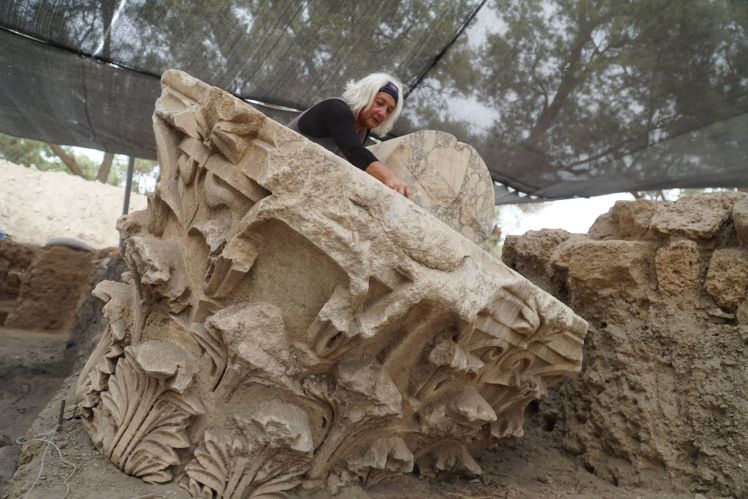
New Light on an Ancient Past:
A renewal project in Tel Ashkelon National Park will reveal the spectacular archaeological remains of a magnificent 2,000-year-old Basilica
The Roman Basilica complex, the largest of its kind in the country, was unearthed in Israel Antiquities Authority archaeological excavations as part of an extensive development project in the national park led by the Nature and Parks Authority, Ashkelon Municipality and the Leon Levy Foundation. On completion of the conservation and restoration work, the complex will be adapted for visitors. The development work also includes the construction of a new network of accessible paths showcasing the park’s unique nature, heritage and landscape.
Tel Ashkelon National Park has recently undergone extensive development work, initiated and funded by the Nature and Parks Authority, Ashkelon Municipality and the Leon Levy Foundation, during which the Israel Antiquities Authority recently revealed a magnificent 2,000-year-old basilica that is the largest of its kind in Israel.
The exciting finds, which also include an ancient odeon (theater), are now being revealed for the first time and will soon be open to visitors to Tel Ashkelon National Park, enhancing the visitor experience at the site. The site will be opened on completion of the development, conservation and restoration work, which includes erecting sculptures and marble columns found in excavations at the site.
The Nature and Parks Authority and the Ashkelon Municipality are also developing and constructing a new network of accessible paths designed to showcase and provide better access to the park’s unique nature, heritage and landscape, thereby enhancing the visitor experience.
During the Roman period, the public life of the city revolved around its basilica (a Roman public building), where its citizens transacted business, met for social and legal matters, and held performances and religious ceremonies.
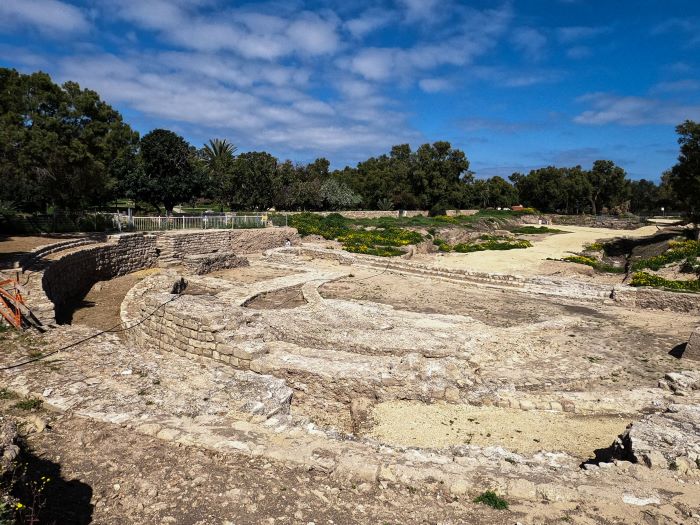
According to Dr. Rachel Bar-Natan, Saar Ganor and Fredrico Kobrin, excavation directors on behalf of the Israel Antiquities Authority, “The huge building is covered with a roof and divided into three parts – a central hall and two side halls. The hall was surrounded with rows of marble columns and capitals, which rose to an estimated height of 13 meters and supported the building’s roof. The floor and walls were built of marble.”
The marble, discovered during many years of archaeological excavations lasting until two years ago, was imported from Asia Minor in merchant ships that reached the shores of Ashkelon, which was a famous, bustling trade city. Roughly 200 marble items weighing hundreds of tons have been found in all, testifying to the building’s great splendor. Among the items, dozens of column capitals with plant motifs were discovered, some bearing an eagle – the symbol of the Roman Empire. Pillars and heart-shaped capitals stood in the corners of the building. Excavations by the British in the 1920s unearthed huge statues, including a statue of Nike, the goddess of victory, supported by the god Atlas holding a sphere, and a statue of Isis – an Egyptian deity depicted as Tyche, the city’s goddess of fortune.
The basilica was devastated in the earthquake that struck the country in 363 CE. The effects of the seismic waves are clearly visible on the building’s floor, providing tangible evidence of the events of that year in Ashkelon. After its destruction, the building was abandoned. During the Abbasid and Fatimid periods, the site of the basilica was transformed into an industrial area and several installations were built in it. In one of these, marble pillars and capitals from the basilica were incorporated in secondary use in the buildings’ walls. There is evidence from the Ottoman period that marble items were cut up for use as paving stones and some of the beautiful architectural features were taken for building construction.
The conservation department of the Israel Antiquities Authority is conducting complex preservation and restoration work on the odeon and the impressive basilica, led by the Nature and Parks Authority and generously funded by the Leon Levy Foundation. The work involves placing the spectacular marble sculptures of ancient Ashkelon in the southern part of the basilica. In the first stage, the odeon will be conserved and restored. Thanks to the Leon Levy Foundation’s donation, it will incorporate modern seating, a stage and a series of explanatory signs. At the same time, a pilot program at the site has begun installing the impressive marble items in place, in a complex operation in which one of the pillars, weighing dozens of tons, was hoisted into the basilica. The floor of the excavated basilica will be restored and filled in, and additional columns will be placed around the perimeter based on lessons learned from the initial program. The public will then be able to access a magnificent basilica, the largest in Israel. In the meantime, visitors will be able to sit on the seating in the odeon – to be completed in the coming months – and observe the work on the nearby basilica.
Meanwhile, the new system of accessible paths being developed by the Nature and Parks Authority and Ashkelon Municipality in the national park aims to make the park’s unique nature, heritage and landscape more readily available, thereby enhancing the visitor experience. The route, about 2 km long, will go through the national park’s main sites, including the world’s oldest arched Canaanite gate, the famous wells of the ancient city, the basilica and the odeon, and the Crusader walls. This chronological trail tracing Ashkelon’s history through the ages will be clearly lined with content signage. A second trail will lead to the ancient wall and Ashkelon’s dunes, providing a glimpse of the rich flora and fauna to the south of the national park. Between the two trails, in the center of the park, a new visitor center will illustrate in an experiential interactive way the vibrant life of the port city and its importance throughout the various periods.
According to Shaul Goldstein, CEO of the Israel Nature and Parks Authority, “The Tel Ashkelon National Park combines a fascinating antiquities site with unique natural resources characteristic of the dunes in the coastal plain. It was the first national park to be declared in Israel in the 1960s and since then, it has been constantly evolving and renewing for the benefit of visitors from all over the country. The unveiling of the basilica and odeon together with the development, preservation and restoration work, which includes the installation of pillars and ancient marble sculptures found in excavations at the site, as well as the addition of new and accessible trails around points of major interest will undoubtedly enhance visits to the park and further emphasize its heritage and uniqueness. We are grateful to our partners for providing tremendous support and guidance in the national park’s development, including the generous assistance of Mrs. Shelby White and the Leon Levy Foundation under the close supervision of archaeologist Prof. Daniel Master.”
Ashkelon Mayor Tomer Glam says, “The Ashkelon National Park is one of the most important ancient sites, both in Israel and in the world, and time and time again it emerges as one of the most visited sites in the country. The city takes great pride in it, investing resources and funding in cooperation with the Nature and Parks Authority, encouraging visitors by subsidizing entry for Ashkelon’s residents and promoting educational and community initiatives. We have recently also finished upgrading the entrance road to the park, which has been transformed to give the park the dignity it deserves. I am convinced that the restoration and conservation work in the park, the new archaeological discoveries and the development work – including new accessible paths – will contribute significantly to the park’s natural beauty and strengthen its status as the most beautiful and well-kept national park in Israel.”
Shelby White, founder of the Leon Levy Foundation, explains that the conservation and restoration work was made possible, among other things, thanks to its generous donation, “When Leon and I visited Ashkelon in 1985, we did not imagine that our ties with that ancient seaport would last for over three decades. I am glad that the odeon, one of the many archaeological discoveries made by the Leon Levy expedition, will now be restored and the famous Roman sculptures of Ashkelon will be returned to their original location. Thanks to this, visitors to the Ashkelon National Park from Israel and around the world will be able to imagine this great city in all its ancient glory.”
“The basilica was founded by Herod the Great, and one historical source suggests that his family came from the city of Ashkelon,” add Ganor, Dr. Bar-Natan and Kobrin of the Israel Antiquities Authority. “During the Roman Severan Dynasty, in the second and third centuries CE, the building was renovated, marble architectural features were brought to the site and a small theater was added. Herodian coins discovered in the bedding of the structure’s ancient floors show that it was built at the time of one of the greatest builders ever to have lived in the country. The writings of the historian Josephus mention Herod’s construction in the city of Ashkelon and list fountains, a bathhouse and colonnaded halls. Today, based on the new archaeological evidence, we can understand the origins of the historical record.”
Photos
Dr. Rachel Bar-Natan at the Excavation of the basilica in the Tel Ashkelon National Park. Photo Yoli Schwartz Antiquities Authority
The Basilica and Odeon Complex in Tel Ashkelon National Park - Yaniv Cohen Nature and Parks Authority








